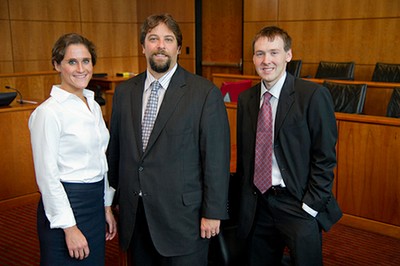CAMDEN — For many defendants, the consequences of criminal convictions don’t just end with a judge’s sentence. There can be a multitude of civil restrictions that come with a guilty verdict or plea.
But oftentimes, those penalties aren’t so clear cut and won’t surface until after a disposition. Two Rutgers–Camden law students are helping to bring these “collateral consequences” into focus.
Kevin Holleran and Julia Rogers, both in their third year at the Rutgers School of Law–Camden, worked with the Defender Association of Philadelphia to create a document that will help Pennsylvania attorneys identify the civil legal consequences of their clients’ criminal convictions.

Rutgers-Camden law students Julia Rogers (left) and Kevin Holleran (right) created a document that will help attorneys define the collateral consequences of criminal convictions. J.C. Lore (middle), a clinical associate professor of law at Rutgers-Camden, supervised the project. They worked with project director Peter Thompson of the Defender Association of Philadelphia, and Kellie Koscher, a Villanova law student.
“We found cases all over the country that showed how little attention the issue has received until now,” says Holleran, of Holland, Pa. “There aren’t many resources like this available to attorneys, so it was nice to be a part of creating a document that could be so useful.”
Holleran and Rogers teamed up with Kellie Koscher, a Villanova University law student, on the pro bono project, dedicating hundreds of hours of their time over the course of more than four months.
A conviction of a felony, misdemeanor, or crime that jeopardizes moral character can lead to restriction of education and employment, public housing, financial assistance, voting rights and other civic responsibilities, and deportation, among other penalties.
The absence of a document that provided a clear outline of the civil consequences of criminal activity hinders an attorney’s ability to effectively represent and communicate with a client, says Peter Thompson, an attorney with the Defender Association of Philadelphia and director of the project.
“There was no document that we could use to give direct advice to our clients on collateral consequences prior to the disposition of their cases,” Thompson says. “We need the clients to know the implications of their plea prior to the disposition of their case. It’s part of providing proper representation to the clients. We’re trying to put the effort on the front end of the trial to tell the clients what to expect.”
It’s an issue that has come under much consideration since the federal Padilla v. Kentucky case, in which the United States Supreme Court decided that criminal defense attorneys must advise non-citizen clients about the deportation risks of a guilty plea.
J.C. Lore, a clinical associate professor of law at Rutgers–Camden and project supervisor, says the document the students created instantly elevates the level of practice for public defenders.
“Suddenly, they have a resource they never had before,” Lore says. “Even though it’s not required by law to advise civil consequences, it’s a matter of best practices. These students have created a valuable tool for best practices across the state of Pennsylvania.”
The 44-page document is currently being utilized by the Defender Association of Philadelphia and will soon be adopted by attorneys throughout the state of Pennsylvania.
“I feel like the importance of creating this document is that it can serve as a model for other states,” says Rogers, of Fort Washington, Pa. “I know that New Jersey is looking to do something similar. We have now this document that serves as a model for other states.”
Koscher, a resident of Wayne, Pa., says, “It allows attorneys to do their due diligence and it helps them do their jobs much more efficiently. “It’s been an invaluable experience for us.”
For more information on the Collateral Consequences Project, email ccp@philadefender.org.
Media Contact: Ed Moorhouse
(856) 225-6759
E-mail: ejmoor@camden.rutgers.edu


